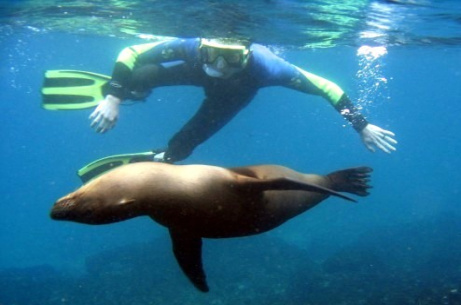
Daniel Storisteanu will begin a PhD in Medicine studying a novel strategy that certain pathogens may use to manipulate the immune system.
Daniel Storisteanu (2012) is a bit of a polyglot. He has always been torn between zoology and medicine and is about to begin a PhD focused on virology. He also has a great sense of adventure and an interest in the arts.
At 25, he has travelled the world and taken part in a range of medical and environmental projects and exploits, including bat conservation, swimming with sealions in the Galapagos and working in a medical clinic in Ecuador.
Part of his interest in travel stems from his international family. His mother is Argentinian and his father Romanian. The two met in Israel where his mother’s family was escaping a military dictatorship in her country and his father’s family was fleeing Ceausescu’s Romania. They soon moved to Toronto where Daniel and his brother and sister were born and grew up.
At high school in Canada Daniel was very interested in drama and biology. He took part in the national theatre programme and worked for two theatre companies.
Daniel leant more towards biology. He was not interested in being a doctor, though – his interest was in the sense of discovery offered by biology.
He took two years off after high school and used them to travel and explore some of his different interests.
First, he went sea kayaking in British Columbia and then he did some mountaineering. After saving some money, he decided to go to Paris, where he lived for seven months. “I wanted to explore beyond Canada, to try something different,” he says.
He got a job at an independent bohemian book shop in Paris where he met lots of interesting characters, including painters, poets, writers and trapeze artists. “I learnt about different approaches to life from people who had never had a regular job in their lives, who have a very romantic view of life coloured by poetry and literature.”
While in Paris, Daniel cycled to Italy, Switzerland and Monaco.
He returned to Canada and worked in a series of jobs, including construction, and then his then girlfriend suggested backpacking in Ecuador. He worked in a medical clinic there, checking people’s vital signs. He then headed to the Galapagos where he swam with sealions, penguins and a whale shark.
The Galapagos trip had a significant impact and he went back to Canada, torn between whether to study medical sciences or zoology. He applied for a course at the University of Toronto doing zoology and environmental science, during which he did a semester at the National University of Singapore on environmental science and marine biology, including some marine biology research.
He decided to take advantage of being in South East Asia and applied to stay for a year to travel around. He volunteered for a World Wildlife Fund human-tiger conflict mitigation project, which involved camping in a rainforest on the Malaysia/Thailand border and doing wildlife surveys. He helped with interviews with indigenous tribes about their environmental perceptions, their fear of tigers and their overall welfare.
After that, he volunteered for a bat conservation research unit in Malaysia on a joint project funded by the Malaysian government and Texas Tech University. He had to catch bats by setting traps in caves in the jungle, check their general health and tag them so the impact of human disturbances on their health could be gauged.
Daniel also managed to squeeze in some more travelling, including a motorbike exploration of Vietnam through the country’s mountainous regions. “People would bring their children out to look at us and a parade of kids would be behind us as we entered towns,” he says.
On his return to Canada, Daniel was still split between medical science and zoology so he worked part time in an immunology laboratory at a children’s hospital studying lung disease and also at provincial parks around Canada, catching turtles and snakes.
One of his professors at the children’s hospital suggested he apply to the University of Cambridge on graduating.
He won a Natural Resources and Engineering Research Council of Canada to do an MPhil in Medical Sciences researching inflammation of the lungs in diseases like asthma.
Viral infection
For his PhD in Medicine, which he begins this autumn, he will study a novel strategy that certain pathogens may use to manipulate the immune system. His lab has recently discovered that the virus, cytomegalovirus, a major cause of disease and death in humans, can exploit the signals released by neutrophils, a type of immune cell. He says these signals cause other cells to be more permissive to viral infection and weaken the immune system’s anti-viral strategies.
Daniel’s research will investigate the mechanisms the virus uses to take advantage of the immune system, and investigate whether they are used by other pathogens, such as tuberculosis and influenza.
He hopes this knowledge will help to identify individuals at higher risk of complications and to develop potential therapies against these diseases.
“Many people are infected with cytomegalovirus, but the virus is not active in them. I am looking at what kind of signals cause the virus to be active and why this happens in certain conditions,” he says.
Daniel has not dropped his interest in the environment while he has been at Cambridge and is Clare College’s green officer. He has also been involved in the Campaign for Female Education in Africa and is a member of the Cambridge University Caving Club.
At 25 he is keeping his options open, he says. “While I’m fully committed to medicine, I’m also still very much interested in the environment and would love to somehow bring them together at some point,” he states.












